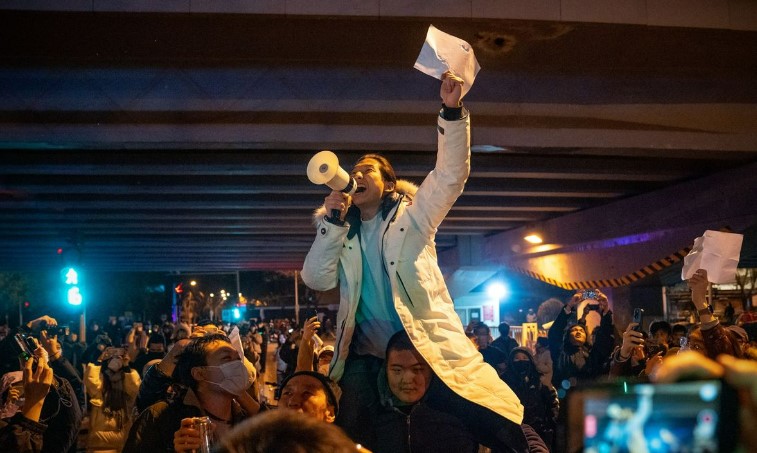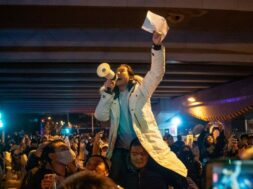
Roving Periscope: China trembles as the pandemic cocks a snook at Zero-Covid policy
Virendra Pandit
New Delhi: As widespread protests against China’s brutal Zero-Covid policy multiplied across the country, where nearly 100 towns and cities are under lockdowns over the fresh outbreak of the infections, panicked investors readied for a dip as markets opened in Asia on Monday to grim reports of growing unrest in the world’s second-largest economy.
According to the latest estimates, about 412 million people were now affected by lockdown measures in China, up from 340 million the week before, according to the Japanese brokerage firm Nomura. Over one-fifth of China’s total GDP-generating sectors across the country is currently under lockdown.
The angry protests of citizens spread to the national capital of Beijing as China witnessed nearly 40,000 coronavirus cases on Monday. For the fifth consecutive day, Beijing alone reported around 4,000 fresh cases. China’s National Health Commission reported 39,452 new cases, including 36,304 local asymptomatic cases.
Widespread protests broke out in the eastern metropolis of Shanghai over the last weekend and quickly spread to Beijing, where hundreds of people converged on a Sunday evening near the Liangmahe river in the central city.
Large crowds carrying lighted candles took to the streets in solidarity with the Shanghai protests and as tributes to those killed in the fire at an apartment block reported under the Covid-19 lockdown in Urumqi in the restive Muslim-dominated Xinjiang Province. They vociferously shouted slogans against the arbitrary lockdowns to curb the spread of the virus.
Many diplomats and foreigners watched the protests close to the diplomatic residential premises in Beijing. The turmoil continued for several hours as the police detained several people trying to break barricades and throw missiles.
These disturbances, viewed as the largest public outcry after the pro-democracy Tiananmen Square incidents of 1989, worried the well-entrenched Communist regime. Protesters in Shanghai on Saturday and Sunday, for the first time, also chanted pro-democracy and freedom slogans and demanded that Chinese President Xi Jinping and the ruling Communist Party step down. They vent their anger as they opposed the lockdowns and pushed the people into Covid-19 medical shelters.
Several students at the prestigious Tsinghua University in Beijing and Communication University in Nanjing also joined protests, holding vigils for the Urumqi fire victims. Unrest forced Tsinghua University to ask students to go home ahead of the January spring festival holidays.
Disturbances erupted in Guangdong, Zhengzhou, Lhasa, the provincial capital of Tibet, and other cities, with participants demanding an end to prolonged lockdowns and compulsory Covid tests, the Hong Kong-based South China Morning Post (SCMP) reported on Monday.
The People’s Daily, the ruling Communist Party’s mouthpiece, on Sunday vowed in a front-page commentary to steadfastly stick with the existing Zero-Covid policy to curb the pandemic. It reiterated China’s self-claimed victory in controlling the pandemic so far and called on Communist party cadres to resolutely overcome misunderstandings, slackness, and war weariness, the SCMP said.
On Sunday, numerous citizens took to the streets and university campuses across China, venting their anger on local officials and the Communist Party as security forces looked on either reluctantly or tried to control the mobs feebly.
Shadows of global recession, increasing inflation, and unemployment are taking a heavy toll on the export-based Chinese economy, impacting other economies as well. The yuan fell, the Australian dollar led commodity currencies lower and the US dollar strengthened as the unrest cast a shadow over risk sentiment. Stock markets in South Korea, Japan, and Australia opened lower on Monday.
“Anything exposed to China might be vulnerable here. We have not yet seen the government respond,” Jessica Amir, a market strategist at Saxo Capital Markets in Sydney, Australia, said. “Either way, forward earnings of Chinese exposed companies will be in question and investors will probably express that by selling,” the media reported.
“Markets will respond negatively to the widespread protests and rising case numbers, which may trigger new supply chain disruptions and dampen consumer demand, at least in the short term,” said Gabriel Wildau, managing director at Teneo Holdings LLC in New York.
Meanwhile, Apple Inc. partner Foxconn has offered bonuses of USD 1,800 to existing workers at its Zhengzhou facility, hoping to sustain the staff levels it needs to run the world’s largest iPhone factory. Foxconn, also known as Hon Hai Precision Industry Co., will top up wages by as much as 13,000 yuan per month in December and January for full-time workers, who joined in November or earlier.
Last week also, the company offered similar bonuses for workers opting to leave its campus, largely to usher out new arrivals who took part in violent protests against virus lockdowns. The unusually generous bonus reflects Foxconn’s urgent need to get assembly lines back up to full speed after a month of dealing with Covid curbs and disruptions that culminated in unrest last week.
Most of Apple’s iPhone Pro models are assembled at the Zhengzhou campus, which usually houses over 200,000 staff. Over 20,000 new hires are reported to have left after the recent protests began.













